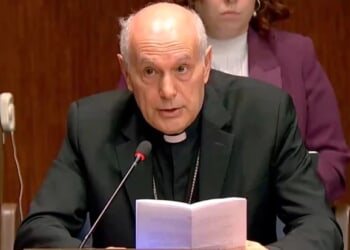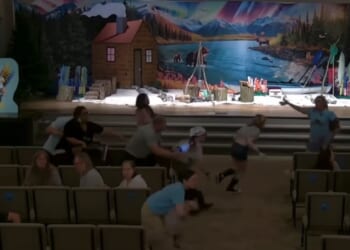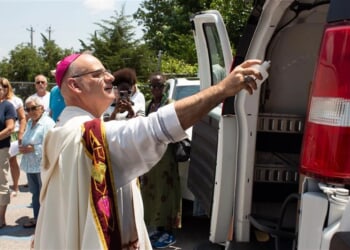As I watched my son’s school performance of Oliver Twist, I wondered what its author would make of the plight of children in 21st Century Britain.
If Sir Charles Dickens was to pen a similar novel today to raise awareness of contemporary child protection failures, what issue would he choose?
Perhaps he would write about the grooming gangs scandal, where thousands – perhaps tens of thousands – of poor white girls have been systematically raped and exploited over decades by organised gangs of mostly Pakistani men. Or would Dickens turn his attention to the thousands of children who were conned into believing they were ‘born in the wrong body’, many of whom went on to be physically disfigured and medically sterilised at the Tavistock Clinic by our National Health Service? Or maybe Sir Charles would seek to stir up public outrage about the exploitation of children by Big Tech, an industry that has caused and profited from an unprecedented rise in child sexual exploitation .
We look back to Victorian times with horror, sickened at the way children – especially poor, orphaned children – were forgotten about and mistreated. Orphanages were full, child labour was rife and girls as young as 12 were sold into prostitution. Thankfully today, the workhouse is no more and children no longer eat gruel. But when it comes to protecting children from exploitation, modern Britain is hardly a model of good practice.
Child exploitation is as old as human history.
There will always be those – mostly men – who view children as an easy target, either as sexual prey or credulous and expendable foot soldiers in criminal enterprise. The reason that more children are not exploited is that most parents are effective in defending their children from those who would do them harm. Biological parents are powerfully and existentially motivated to go to great lengths to protect their own offspring, but that fierce and self-sacrificing instinct is often diluted when it comes to protecting the children of others.
This is not a moral judgment but a fact of evolution. Children who lack the protective presence of their natural parents – especially their fathers – are therefore at far higher risk of exploitation.
Poverty also compounds the risk.
Children without fathers are more likely to be poor, poverty makes parents less able to protect their children and poor families are less likely to benefit from wider social networks of trustworthy adults that help to shield children from predators. Neighbourhoods that are economically deprived have higher rates of fatherlessness; children in these same places are more at risk from all kinds of exploitation. Take Blackpool for example, simultaneously the poorest town in the UK, an area with one of the highest divorce rates, a hot spot for grooming gangs and a place where children are three times more likely to be referred to gender clinics than the national average.
Sadly, there have always been, and will always be, children who are impoverished and fatherless. But in Britain there is a long-established moral consensus that wider society has a special duty to protect these children. Yet the reality is that, however good our intentions, we are failing in this duty.
The shame of Britain’s grooming gangs, exposed in harrowing detail by journalists such as GB News’ Charlie Peters, is perhaps the most damning indictment of our inability to protect vulnerable children from exploitation. Of course, the responsibility for these awful crimes lies with the perpetrators. But nevertheless, the gangs were enabled by a failure of adults in positions of responsibility to report, or even sometimes to identify, abuse.
The Tavistock scandal was similarly enabled by a dereliction of duty. Just like the victims of the grooming gangs, children referred to gender clinics were disproportionately likely to be children in the care of the state. Yet those who were in loco parentis failed to prevent children from harm.
Why did these adults not stand up for the children in their care?
They stayed silent because they feared the costs of speaking out. Too often, those who had the power to act, failed to do so for fear of the consequences of challenging prevailing social orthodoxies.
In the case of the grooming gangs, many of those who could have exposed the abuse were unwilling to challenge the liberal doctrines of diversity and multiculturalism and feared being labelled ‘racist’. The Tavistock clinic went under the radar for years because social workers and teachers were frightened, they would be labelled ‘transphobic’ if they challenged the doctrine of gender ideology.
Most people in professional jobs feel pressure to conform to high status opinions and to avoid social stigma.
And there are good evolutionary reasons for this; we are much more likely to survive and prosper if we fit in with those around us and avoid confronting those in power. When the interests of our own biological children are at stake, the fear of financial loss or social ostracism is more easily overridden. But for many – if not most people – when the duty to speak up for someone else’s child is in direct conflict with the desire to keep one’s job or maintain social and economic status, very often self-interest wins out. Of course this is morally reprehensible, but it is also an observable fact of human nature.
Sometimes, courageous individuals make conscious choices to do the right thing, regardless of the personal cost. Police officer Maggie Oliver bravely exposed the failure of authorities to tackle grooming gangs in Rochdale. Dr David Bell blew the whistle on the Tavistock Clinic. US mum Laila Mickelwaite stood up to the might of Big Porn, eventually forcing Pornhub to take down 90% of the platform’s videos, millions of which showed the real rapes of real children.
But these are rare examples.
For every Maggie Oliver, there hundreds of people who are aware of children being exploited and fail to act.
We are hopelessly naïve if we think that better education or improved safeguarding procedures will increase the number of people who are willing to risk blowing the whistle. Instead, we must change the balance of incentives, so that those with responsibility for protecting vulnerable children fear the consequences of staying silent more than they fear the consequences of speaking up. This means prosecuting those who covered up the rape gangs, the Tavistock scandal and tech bosses who turn a blind eye to online child exploitation.
Parliament should also introduce a statutory duty to report underage sexual activity and prosecute all those who have sex with children. There is little point in having an age of consent if it is – as now – in name only. When it comes to online exploitation, there are currently no consequences for tech company employees who are aware of child exploitation on their platforms and do nothing about it. Attempts to introduce this in the Online Safety Act have already been watered down by Ofcom.
But increasing the incentives to speak up for children won’t help if adults fail to identify child exploitation in the first place. Liberalism has eroded the very concept of childhood, with children now seen as mini-adults with ‘rights’ to choice and autonomy, rather than as the most vulnerable in society who must be protected – often from themselves.
When Technology Secretary Peter Kyle was recently asked why the Government is not considering banning smartphones to protect children, he replied that children are very clear that they ‘want technology’. I don’t doubt it – children also want sweets, alcohol and no homework.
From the rape gangs to the Tavistock to online sexual exploitation, the idea that children have a right to autonomy has blinded adults to the abuse taking place before their eyes. Grooming gang victims were viewed as ‘child prostitutes’ or girls who had made a ‘lifestyle choice’ to have sex with older men. Children who wanted to ‘change gender’ were affirmed by adults who agreed they had been ‘born in the wrong body.’ If we’re going to protect vulnerable children from exploitation, we have to dismantle the idea that children should have autonomy. Protecting children often means preventing them from doing what they want to do.
We must do better at identifying and exposing child exploitation. But the ultimate goal is to prevent it happening in the first place. Over the centuries, technological and social changes have birthed new risks of child exploitation, and each must – eventually – be dealt with through the law. Industrialisation ushered in an age of child labour, with children as young as four years old being forced to work in appalling conditions in mines and factories. Urbanisation enabled child prostitution. These horrors were ended or at least reduced by regulations.
In 21st century Britain, there are many new and emerging threats to children, and we must adapt our laws to address them. The modern phenomenon of mass immigration from non-Western countries is in large part responsible for the rise of the rape gangs, and the clannish practice of consanguineous marriage has been crucial in covering them up. In her recent report into the issue, Baroness Casey highlighted the involvement of asylum seekers in many of the crimes. A failure to control or even limit immigration is not just an economic or a political issue – it has led directly to a rise in child exploitation.
The exponential rise in children reporting gender dysphoria has been driven by adult trans activists but enabled and spread through smartphones and social media – an emergent technology that must be tackled with new laws. These technologies have also enabled the industrial scale sexual exploitation of children.
Liberals have a habit of characterising laws that limit individual autonomy as old fashioned, regressive; even authoritarian. But unlimited adult autonomy and the protection of vulnerable children are mutually exclusive. We can’t have both. If we want to protect children from exploitation, we must place restrictions on the modern threats of pornography, immigration, smartphones, gender-treatments and under age sex, restrictions that will – and should – reduce adult freedoms.
Unfortunately, Members of Parliament – who could legislate in these areas – are unlikely to do so, captured as they mostly are by liberal doctrine. Last week’s vote to decriminalise abortion to birth, the Government’s desperation to retain its Muslim voting block and Labour MPs’ continued support for the indoctrination of children with trans ideology demonstrate that there is currently no parliamentary majority to pass effective child protection legislation.
The law must be used both to punish those who fail to report abuse and limit the opportunities for child exploitation. But if we really want to reduce the number of children who are vulnerable to abuse, we must increase the number of children who live with both parents throughout childhood.
The UK has become the family breakdown capital of the West, with nearly half of children experiencing the separation of their parents. That means 3.5 million children growing up apart from their fathers, and therefore lacking a key defence against exploitation. These are uncomfortable things to say, but they are true: dads matter. And if we have learned anything from the shame of the rape gangs or the Tavistock clinic, it is that protecting children means speaking the truth and challenging liberal shibboleths.
Family breakdown is not inevitable. Couples who marry are far more likely to stay together than those who don’t. The protective effect of marriage is so strong that, even though over a half of babies are born to unmarried parents, if a child’s parents are still together by the time he reaches 12 years old, there is an 84 per cent chance those parents are married. In countries where marriage is supported in the tax system, and where leaders are not afraid to talk about the benefits of marriage, separation rates are lower. Liberalism views marriage as an optional and potentially oppressive restriction on the autonomy of adults; but for children growing up with both parents can make the difference between safety and exploitation.
No government can improve human nature.
Better ‘education’ and ‘awareness’ will not protect vulnerable children from those who mean them harm. Like any crime or social ill, tackling child exploitation calls for prosecution, prevention and regulation. But it also requires us to recognise that prevailing liberal orthodoxies such as the idea ‘all cultures are equal’, ‘gender is fluid’ or ‘individual autonomy should be absolute’ are themselves a threat to child safeguarding.
Liberalism has failed children, but many of those in authority are yet to concede it.


![Former Bravo Star Charged After Violent Assault Using a Rock-Filled Sock in Tennessee Walmart [WATCH]](https://www.right2024.com/wp-content/uploads/2025/07/Former-Bravo-Star-Charged-After-Violent-Assault-Using-a-Rock-Filled-350x250.jpg)



![Man Arrested After Screaming at Senators During Big Beautiful Bill Debate [WATCH]](https://www.right2024.com/wp-content/uploads/2025/06/Man-Arrested-After-Screaming-at-Senators-During-Big-Beautiful-Bill-350x250.jpg)










